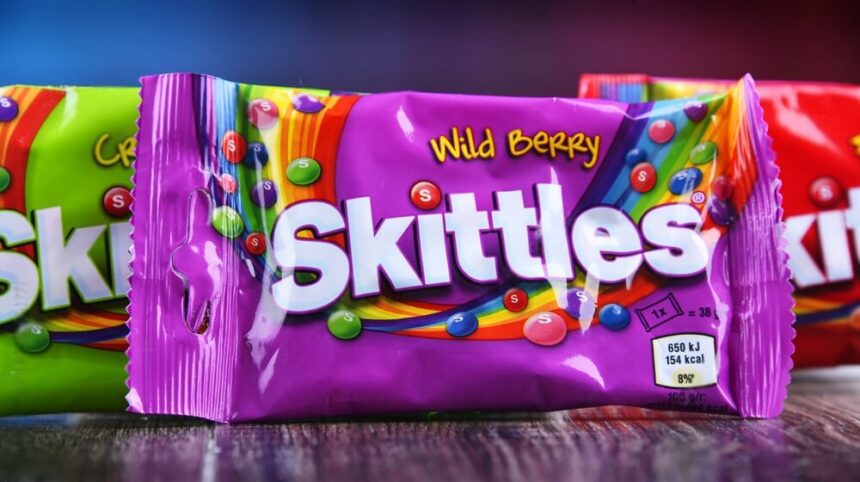Hey there, fellow cat lovers! We’ve all been there—curious, eyes wide, and desperately seeking answers to the most peculiar questions about our furry friends. Today, we embark on a quest to uncover a mystery that has left our whiskered companions longing for a taste of the rainbow. Brace yourselves as we dive into the realm of feline culinary curiosity: Can cats eat Skittles? Let’s dive right into this sugary conundrum and uncover the truth about cats and Skittles.
A Palette of Flavors – What are Skittles?
Before we delve into the feline fascination with Skittles, let’s familiarize ourselves with these bite-sized candies that have captured the hearts of humans for decades. Skittles are chewy fruit-flavored candies coated in a vibrant, candy shell. They come in an assortment of rainbow hues, each representing a unique fruit flavor. From tangy citrus sensations to juicy berry bursts, Skittles are a carnival of flavors in a tiny package.
Untangling the Skittles Dilemma
Alright, let’s address the captivating question head-on: No, cats should not eat Skittles. Now, hold your purrs! We’re about to unveil the reasons why these colorful candies are not suitable for our feline pals.
The Colorful Truth about Cats and Skittles
Not a Feline Flavor Fiesta! Skittles are bursting with sugary sweetness and artificial flavors that may not sit well with your cat’s delicate palate. Cats have different taste receptors than humans and are not naturally inclined to enjoy or benefit from the fruity flavors found in Skittles.
Sugar Rush Woes! Skittles are loaded with sugar, and cats’ bodies are not designed to process large amounts of sugar. Excessive sugar consumption can lead to weight gain, dental issues, and potentially serious health problems like diabetes in our furry friends. It’s best to keep those sugary temptations away from their reach.
Artificial Ingredients Alert! Beyond the sugar content, Skittles contain a medley of artificial additives, including food coloring and flavoring agents. These additives, although harmless to humans in moderation, can trigger allergic reactions or digestive distress in cats. Our furry companions have a sensitive digestive system that requires a more natural, tailored approach when it comes to their nutrition.
Chocolate Conundrum – A Double Whammy
Let’s talk about another critical factor to consider—chocolate. While Skittles don’t contain chocolate, it’s worth mentioning that many cats are highly sensitive to this beloved human treat. Chocolate contains theobromine, a compound that can be toxic to cats, leading to symptoms ranging from restlessness to more severe issues like seizures. So, even if you stumble upon chocolate-covered Skittles, keep them far away from your feline friend.
Paw-some Alternatives for Cat Treats
While Skittles are off the menu, there are plenty of other cat-friendly treats that can make your furry friend’s taste buds dance with joy. Here are some colorful alternatives that will keep their whiskers twitching:
Feline-Specific Treats: Look for specially formulated cat treats available at pet stores. These treats are designed to meet your cat’s nutritional needs while offering a variety of flavors they’ll love. Opt for treats with high-quality ingredients and minimal additives.
Meaty Marvels: Lean meats like cooked chicken or turkey can be a purr-fect treat for your cat. Ensure there are no seasoning, bones, or harmful additives. Cats are carnivores at heart and will appreciate the meaty goodness.
Fishy Delights: Cats often have a fondness for fish. Offer them small amounts of cooked fish, such as salmon or tuna, as an occasional treat. Just be cautious of any added seasoning or fish bones.
The Final Word – Prioritizing Your Cat’s Health and Happiness
In conclusion, Skittles are not a suitable treat for cats. Their high sugar content, artificial ingredients, and flavors that cats may not appreciate make them an unsuitable choice for our furry companions. Instead, opt for cat-friendly treats specifically designed to meet their nutritional needs and taste preferences.
Remember, your cat’s health and well-being should always come first. Consult with your veterinarian for advice on a balanced diet and suitable treats for your feline friend. With a little creativity and care, you can find plenty of other delightful treats to spoil your kitty without compromising their health.



